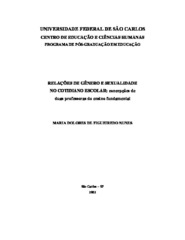Relações de gênero e sexualidade no cotidiano escolar: concepções de duas professoras do ensino fundamental.
Abstract
This work has as starting point the question: How do female teachers of first
graders at Elementary Schools perceive the construction of their conceptions and
experiences concerning, specifically, their work with sexuality and gender relations that
are present in classrooms and other school premises ?
Its objectives were to identify through interviews with female teachers: a)the
perceptions about the course of their professional formation; b) their perceptions about
sexuality and gender relations present in the interpersonal relations in the classroom; c)
perceptions of ways in which they themselves deal with questions related to gender and
sexuality; d) conceptions that enter their perceptions (or their absence) about sexuality and
gender relations of their male and female pupils; e) their personal conceptions of sexuality
and gender relations that influence their perceptions and conceptions of sexuality in
infancy and gender relations; f) how their conception interferes with the relations that
they establish with their male and female pupils and which they let these establish with
them.
To collect data two female teachers of local State schools in São Carlos, State of
São Paulo, Brazil, were interviewed. Analyzing their testimony resulted in three thematic
focos, which are: the formation and the pedagogical experience; b) the male and female
pupils and the female teacher: perception of gender relations present at school; c)
sexuality present at school.
The results of the research confirmed that the school provides its pupils with
Sexual Education, ruled by sexist stereotypes and by hiding the infantile sexuality, as
already disclosed by extensive literary work about this subject..
Analyzing the interviews of the female teachers also demonstrated that they
perceive that their conceptions originate , to a large extent, in multiple factors, among
others, the home education, which they received during infancy, and which was heavily
influenced by Christianism, predominantly Catholicism. The media, represented by
television, but mainly by magazines for adolescents, also took part in this construction,
giving information nor always available through family or friends. The data also revealed
that the teachers training courses only superficially approach the human sexuality question
without special attention to the infantile sexuality. Moreover, the interviews disclosed that
the school educators visualized very little, and in an intuitive and spontaneous way, the
sexuality of their male and female pupils, as well as their manifestations. Finally, these
female teachers said to believe in the importance and in the necessity of a formal Sexual
Education in the school curriculum with teachers specially prepared for this task.
